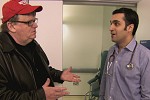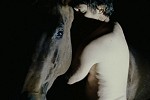 Shadows off the beaten path
Shadows off the beaten path< < D O C S > >
last update 15.Oct.07
See also: SHADOWS FILM FESTIVAL
 R E V I E W B Y R I C H C L I N E
R E V I E W B Y R I C H C L I N E
 The fact that this film shines a light into an unknown corner of art history makes it a vitally important document. And it also tells a strongly compelling story about two men who turned the art world on its head.
The fact that this film shines a light into an unknown corner of art history makes it a vitally important document. And it also tells a strongly compelling story about two men who turned the art world on its head.
Born into a wealthy Manhattan family, Sam Wagstaff served in World War II then threw away an advertising career to study art history. By the early 1960s, he was entrenched in the New York art scene. In the early '70s he met photographer Robert Mapplethorpe, who sparked a new passion both personally and artistically. Together they changed the way the art world looked at photography. And with their good friend Patti Smith, they made a formidable trio on the scene. But their sex-and-drugs lifestyle took its toll: Wagstaff died from Aids in 1987, and Mapplethorpe followed two years later.
Filmmaker Crump assembles this with a slick touch that's also somewhat amateurish in its erratic use of captions and interviewees. His ace in the hole is Wagstaff's astounding collection of photographs, which float across the screen magnificently, keeping us absolutely gripped as we learn more about the enigmatic man who collected them and legitimised an entire art form. Wagstaff's collection (now owned by the Getty) is still unrivalled, and includes images spanning the history of the camera, snapshots and portraits, news photos and landscapes from all over the world.
Where the film starts to come together meaningfully is in the examination of what the collection says about Wagstaff himself--the way he sought out images that could almost be called mirrors of himself, the way he encouraged Mapplethorpe's photographic work and essentially engineered his career, the way he was a different person to each of his friends, struggling to balance his buttoned-up background with his Bohemian lifestyle.
There is some critical examination of Wagstaff and his work, but essentially this is a warm, affectionate portrait of a man few people know anything about, but whose impact on the art world is immeasurable. Crump's film is a vitally important document in this respect, bringing out Wagstaff's personality and vividly capturing the stories of the people who knew him.
narr Joan Juliet Buck
with Patti Smith, Dominick Dunne, Pierre Apraxine, Philippe Garner, John Szarkowski, Jean-Jacques Naudet, Timothy Greenfield-Sanders, Jeffrey Fraenkel, Clark Worswick, Eugenia Parry, Raymond Foye, Gordon Baldwin

release US May.07 tff;
UK Oct.07 lff
07/US 1h17

2.Oct.07 lff
 R E V I E W B Y R I C H C L I N E
R E V I E W B Y R I C H C L I N E
 The purest of documentaries, this cleverly made film tells its story without any embellishments, allowing the participants to have their say and leaving the viewers to make up their own minds about what they see.
The purest of documentaries, this cleverly made film tells its story without any embellishments, allowing the participants to have their say and leaving the viewers to make up their own minds about what they see.
The film follows Becky Fischer, a fundamentalist Charismatic minister who runs Kids on Fire camps in North Dakota to get children fired up for Christian action. Fischer is passionate about her work, believing that "kids are so open" and "usable to Christianity", so she challenges them to take an active role as "an army for Christ" to "fix this sick world".
Along the way, she and her team teach pointed messages against abortion, evolution and global warming, reserving special hatred for Harry Potter, then urging the kids to bless a cardboard cut-out of George W Bush, who they revere almost like a prophet. We also meet three kids, aged 9 to 12, who take this extremely seriously, and are seen at the camp, visiting Ted Haggard's mega-church in Colorado (he stepped down amid a sexuality scandal after this film's US release) and protesting against abortion on the streets of Washington DC.
The filmmakers allow one voice of criticism aimed specifically at the mixing of politics and religion. Christian radio presenter Mike Papantonio comments that the religious right's us-versus-them mentality is dividing the country and ignoring Jesus' clear teaching that Christians should be peacemakers rather than warmongers. Eventually he interviews Fischer on air, and their encounter is extremely telling.
But it's the filmmakers' even hand that makes this documentary such essential viewing. Each person on screen is a recognisably real person, from the sharp children to Fischer and her staff. These are true believers, whether we agree with them or not. And when one child takes the microphone at a meeting and expresses his deeply felt doubts, we wonder how they reacted to this.
Along the way, the filmmakers let everyone express themselves clearly, and as a result, fundamentalist evangelicals will feel that this film is a powerful example of their ministry and social strength. Everyone else, however, will beg to differ, cringing at the militaristic language and especially the emotionally manipulative methods aimed at children who are simply not equipped to discern the truth in what they are being told.
with Becky Fischer, Mike Papantonio, Ted Haggard, Levi, Rachael, Tori
 release US 15.Sep.06,
release US 15.Sep.06, UK 23.Nov.07
06/US A&E 1h24
23.Sep.07
 R E V I E W B Y R I C H C L I N E
R E V I E W B Y R I C H C L I N E
 Michael Moore mercifully steps back from the pushy tone of Fahrenheit 9/11 with this entertaining documentary about American health care. Frankly, in the USA this should be the most important film of the year.
Michael Moore mercifully steps back from the pushy tone of Fahrenheit 9/11 with this entertaining documentary about American health care. Frankly, in the USA this should be the most important film of the year.
The starting point is that some 50 million Americans have no health insurance, 18,000 people die every year as a direct result of this, and insurance companies have become so greedy that they're denying coverage to their policy holders whenever possible. Moore presents striking evidence, both through research and people telling their intensely personal stories, and these facts alone should spark a revolution.
From here, Moore examines the origin of a system that has turned health care from a public service (as in every other industrialised country) into a for-profit business. He traces government action and inaction, from Nixon's creation of HMOs in the 1970s to Clinton's war with the American Medical Association over universal health care in the 1990s. And it's fairly clear that the medical industry has bought the US presidency and Congress. The result is that the USA is 37th in the world for health care, with infant mortality and average life-spans worse than many third world countries.
Moore doesn't appear on-screen until about halfway in, to take us on a tour of countries with socialised medicine. In Canada, France, the UK and Cuba, he finds a situation that baldly contradicts AMA propaganda. Sure, these systems aren't as perfect as Moore presents them to be, but the fact remains that these countries have universal, free care as a basic human right. And the residents live longer. Criticise Moore for his editorialising, but don't miss his urgent message.
Moore's genius as a filmmaker is to find people willing to tell their stories on camera. They put a face to the situation that simply can't be denied, drawing out emotions and righteous indignation. His recurring, valid question is: Why isn't health care a public service like schools, police and the fire department, like it is in all developed nations except the USA? This is an engaging, extremely well shot and edited film that draws on humour and irony to stir simple outrage at evil corporations that are, literally, letting thousands of Americans die each year.
with Michael Moore, Tony Benn, Aleida Guevara, Frank Cardile, Reggie Cervantes, John Graham, Becky Malke, Jacques Milliez, Charlie Norwood, Linda Peeno, Tracy Pierce, Maria Watanabe
 release US 22.Jun.07,
release US 22.Jun.07, UK 26.Oct.07
07/US Weinstein 2h03
CANNES FILM FEST

27.Sep.07
 R E V I E W B Y R I C H C L I N E
R E V I E W B Y R I C H C L I N E
 Artful and beautifully assembled, yet also maddeningly enigmatic, this narrative documentary uses real testimony (and some people playing themselves) to challenge us about one of society's strongest taboos: zoophilia.
Artful and beautifully assembled, yet also maddeningly enigmatic, this narrative documentary uses real testimony (and some people playing themselves) to challenge us about one of society's strongest taboos: zoophilia.
It's the story of the notorious Enumclaw horse incident of 2005, when a man known only as Mr Hands (Paulsen, in the film's dramatisation) was dropped off by two friends (Coyote and Hodgkinson) at a hospital with acute internal bleeding as the result of sexual activity with a horse. At the time, bestiality wasn't illegal in Washington (it is now), so the tenuous criminal charges related to animal cruelty. But the case completely changed the so-called "zoo" community.
Filmmaker Devor shoots this in an impressionistic style, never actually showing us the events, but giving us a clear sense of the people involved. And by letting all of the "characters" have their say, he manages to tell the story without passing any sort of judgment, which makes the film a true documentary even without any standard documentary footage.
The film's main achievement is to challenge us, without ever indulging in lascivious details, to see from the zoos' point of view--to try to understand, even in a vague way, why they choose to engage with intelligent animals that show affection without any emotional interaction. These people believe they are completely normal, and don't understand what all the fuss is about; they struggle to balance their yearnings with their religious backgrounds and regard like-minded people as family members.
On the other hand, the horse rescuers Jenny and John Edwards are horrified, convincing themselves that they see men (and animals) who are deeply disturbed. But in the end even they have to admit that they've begun to doubt their previously held beliefs. It's disturbing and challenging, as the film confronts an issue we would really rather pretend doesn't exist at all. And the filmmaker's strongest point is that just because these men were caught and had their names dragged through the mud, it doesn't make them suddenly more evil than they were before, when they were considered pillars of the community. They haven't changed; perhaps we've coloured them with our own preconceptions.
scr Robinson Devor, Charles Mudede
with Coyote, Russell Hodgkinson, John Paulsen, Jenny Edwards, John Edwards, Michael Minard, Malayka Gormally, Conor Gormally, Ken Kreps, Richard Carmen, Tom Gormally, Brad Harrington
 release US 25.Apr.07,
release US 25.Apr.07, UK Oct.07 lff
07/US ThinkFilm 1h20
SUNDANCE FILM FEST
CANNES FILM FEST

10.Oct.07 lff


See also: SHADOWS FILM FESTIVAL | SHORT FILMS
© 2007 by Rich Cline, Shadows
on the Wall